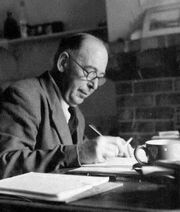No edit summary Tag: Visual edit |
No edit summary |
||
| Line 1: | Line 1: | ||
{{real}} |
{{real}} |
||
| + | [[File:C.S. Lewis.jpg|thumb]] |
||
| ⚫ | |||
| + | |||
| + | {{Quote 2|If we find ourselves with a desire that nothing in this world can satisfy, the most probable explanation is that we were made for another world.|C. S. Lewis<ref>[https://www.goodreads.com/quotes/6439-if-we-find-ourselves-with-a-desire-that-nothing-in]</ref>|}} |
||
| ⚫ | '''C.S. Lewis''' (born '''Clive Staples Lewis '''and called '''Jack''' by his friends) (November 29, 1898 - November 22, 1963) was a good friend of [[J.R.R. Tolkien]], and the author of ''[http://narnia.wikia.com/wiki/The_Chronicles_of_Narnia The Chronicles of Narnia.] ''Lewis was a member of the small literary society ''[[The Inklings]]'', along with [[J.R.R. Tolkien|Tolkien]] and Tolkien's son [[Christopher Tolkien|Christopher]]. |
||
==Similarities with Tolkien's works== |
==Similarities with Tolkien's works== |
||
| Line 19: | Line 22: | ||
==See also== |
==See also== |
||
*{{Wikipedialink|http://en.wikipedia.org/wiki/C. S. Lewis|C.S. Lewis}} |
*{{Wikipedialink|http://en.wikipedia.org/wiki/C. S. Lewis|C.S. Lewis}} |
||
| + | ==References== |
||
| − | |||
| + | <references /> |
||
{{DEFAULTSORT:Lewis}} |
{{DEFAULTSORT:Lewis}} |
||
Revision as of 14:33, 18 August 2018

- “If we find ourselves with a desire that nothing in this world can satisfy, the most probable explanation is that we were made for another world.”
- ―C. S. Lewis[1]
C.S. Lewis (born Clive Staples Lewis and called Jack by his friends) (November 29, 1898 - November 22, 1963) was a good friend of J.R.R. Tolkien, and the author of The Chronicles of Narnia. Lewis was a member of the small literary society The Inklings, along with Tolkien and Tolkien's son Christopher.
Similarities with Tolkien's works
There are some similar themes between the major works of the two writers, which might be no coincidence - since they are known to have, while writing their respective books, shared their "work in progress" with each other and had no objection to the other "borrowing". In the preface to That Hideous Strength, Lewis makes an explicit reference to Tolkien's Numenor (which Lewis spelled "Numinor") and linked it with the plot of his own book: The magic of the wizard Merlin, who has an important role in this book, is mentioned as being derived from that of magical refugees who arrived in prehistoric Britain from the sunk Numenor/Atlantis.
The works of both writers include a set of beings who resemble the gods and goddesses of pagan pantheons, but who - though enormously powerful - are no gods, nor do they claim to be ones, but rather the servants or angels of a single true God, similar to that believed in by monotheistic religions and particularly Christianity (both writers were devout Christians). In Tolkien's works these beings are the Valar who serve Eru Ilúvatar; Lewis mentions the Eldils, or Oyarsas, who are subordinate to Maleldil.
And in the writings of both there is an evil rebel - Melkor/Morgoth in Tolkien's works, "The Bent One" in Lewis' - who is the source of Evil in the world, and seems related to the Lucifer of Christianity.
Further can be noted that the Mount Doom (chapter) - in which occurs the climatic final battle for the ring between Gollum and Frodo - has a close parallel in Lewis' "Perelandra". In both, a battle takes place in an underground chamber near a chasm at whose depth volcanic fire is burning; both battles end with "The Bad Guy" falling into the fire and being utterly consumed; and in both books, this outcome is vitally needed in order to deliver a whole world from evil domination.
Moreover, some characters shared similar names, for example, in The Lord of the Rings, there is an inn named Prancing Pony located in Bree. While in C.S. Lewis' Narnia, there is a pracing pony named Bree.
Finally, it can be mentioned that Lewis' That Hideous Strength includes an evil scientist who hates trees and is engaged in wantonly destroying them - exactly like Saruman's conduct in the Shire and towards Fangorn Forest.
